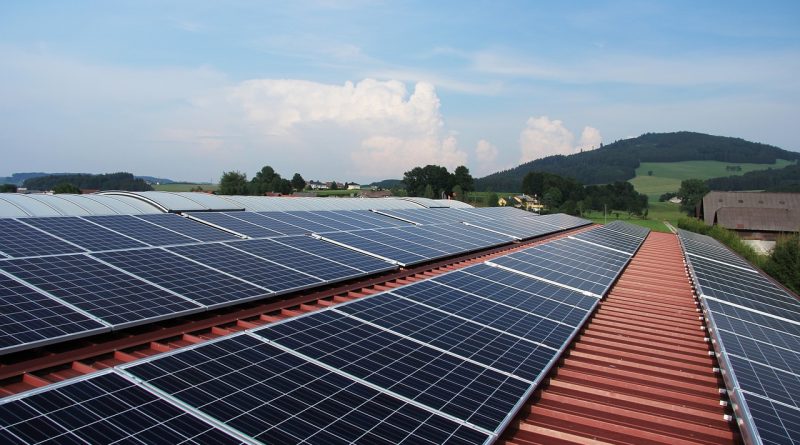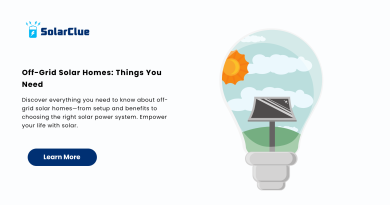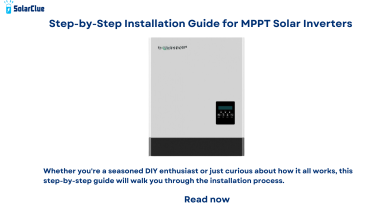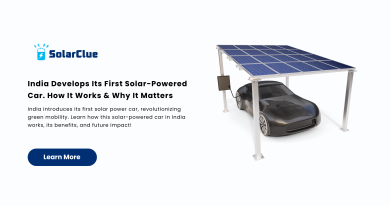How On-Grid and Off-Grid Solar Power Systems Work
Solar power is a rapidly growing industry that provides clean and sustainable energy solutions. When it comes to harnessing solar power, there are two main types of systems that are commonly used: on-grid and off-grid solar power systems. These systems differ in terms of their functionality, purpose, and the way they are connected to the electrical grid. In this blog, we will delve into the workings of on-grid and off-grid solar power systems, exploring how they function and the benefits they offer.
Table of Contents
On-Grid Solar Power Systems
On-grid solar power systems, also known as grid-tied or grid-connected systems, are designed to operate in conjunction with the electric grid. These systems rely on a two-way flow of electricity between the solar panels and the grid. The solar panels, which are installed on the rooftop or in an open area, absorb sunlight and convert it into direct current (DC) electricity. This DC electricity is then converted into alternating current (AC) through an inverter, making it compatible with the electrical appliances and devices used in households and industries.
The energy produced by the on-grid solar power system is primarily used to cover the electricity demand within the premises. Any excess energy generated can be fed back into the grid, effectively turning the electricity meter backwards. This process is known as net metering or feed-in tariff, depending on the country or region. In essence, the excess energy becomes an electricity credit which can be utilized when the solar panels are not producing enough electricity (e.g., during nighttime or cloudy days).
One of the main advantages of on-grid solar power systems is the ability to benefit from net metering. This means that the user can not only offset their own energy consumption but can also receive financial compensation for the surplus energy they contribute to the grid. Additionally, since these systems are connected to the grid, there is no need for expensive battery installations, making them more affordable and convenient.
Off-Grid Solar Power Systems
In contrast to on-grid solar power systems, off-grid solar power systems, also known as standalone systems, are not connected to the electrical grid. These systems are designed to produce and store energy independently, making them suitable for remote locations or areas without access to the grid. Off-grid systems utilize solar panels that convert sunlight into DC electricity, which is then stored in batteries for later use. The batteries act as a reservoir, supplying power during periods of insufficient sunlight.
An essential component of off-grid solar power systems is a charge controller, which regulates the charging and discharging of the batteries. This prevents overcharging or deep discharging, prolonging the lifespan of the batteries. Additionally, off-grid systems require an inverter to convert the DC electricity stored in the batteries into AC electricity, ensuring compatibility with the electrical devices being used.
Being self-sufficient and independent from the grid, off-grid solar power systems provide energy in areas where connecting to the electrical grid is impractical or cost-prohibitive. These systems are commonly used in rural areas, remote properties, cabins, boats, and RVs. While off-grid systems offer the advantage of energy autonomy, they require careful planning and maintenance to ensure a reliable and consistent power supply.
Comparison and Benefits
Both on-grid and off-grid solar power systems have their own unique advantages and cater to different needs. On-grid systems offer several benefits, such as the ability to sell excess energy back to the grid, reduced electricity bills, and a lower environmental impact by relying on clean energy sources. These systems are more suitable for urban areas with existing electricity infrastructure and are an excellent option for individuals looking to reduce their carbon footprint while enjoying financial incentives.
On the other hand, off-grid solar power systems allow individuals to become completely self-reliant when it comes to generating electricity. These systems offer the freedom and flexibility to live in remote locations or properties not connected to the grid. Off-grid systems also provide a reliable source of energy during power outages and can be an excellent choice for eco-conscious individuals who prioritize energy independence and sustainability.
Conclusion
Empower your energy choice with SolarClue® as we demystify the workings of on-grid and off-grid solar power systems. Whether you seek grid connectivity or yearn for energy independence, our experts provide tailored solutions. On-grid systems seamlessly interact with the utility grid, while off-grid systems ensure continuous power using advanced battery storage. Both systems are scalable, adapting to changing energy needs. SolarClue® guides your transition, offering the flexibility of grid-tied solutions or the self-sufficiency of off-grid setups. Contact SolarClue® today for a personalized consultation, and let’s embark on a solar journey that aligns with your unique energy aspirations.
Frequently Asked Questions
On-grid systems are connected to the utility grid, allowing users to draw power from and potentially feed excess power back into the grid. Off-grid systems operate independently, relying on energy storage solutions like batteries.
On-grid systems draw electricity from the utility grid when solar production is low, and excess power generated can be supplied back to the grid, often earning credits.
No, for safety reasons, on-grid systems typically shut down during outages. However, battery storage can be added for backup power.
Off-grid systems store excess energy in batteries, allowing for a continuous power supply even when sunlight is unavailable, such as during the night or cloudy days.
Yes, but they are more commonly used in remote areas without grid access, providing energy independence.
In both systems, inverters convert DC power generated by solar panels into AC power, making it compatible with household appliances.
Batteries are optional for on-grid systems, but they are commonly used to store excess energy for use during times of low solar production or outages.
Batteries in off-grid systems store excess energy, ensuring a continuous power supply during periods of low sunlight or at night.
Both systems are scalable. On-grid systems can be expanded by adding more solar panels, while off-grid systems can increase battery storage and solar panel capacity.
Contact SolarClue® for personalized guidance. Our experts assess your energy needs, location, and preferences, helping you choose the most suitable on-grid or off-grid solar power solution.




